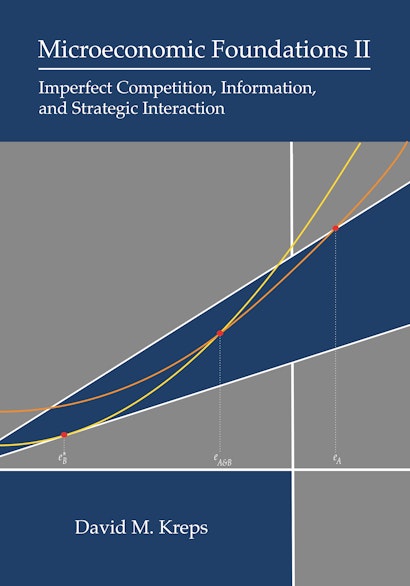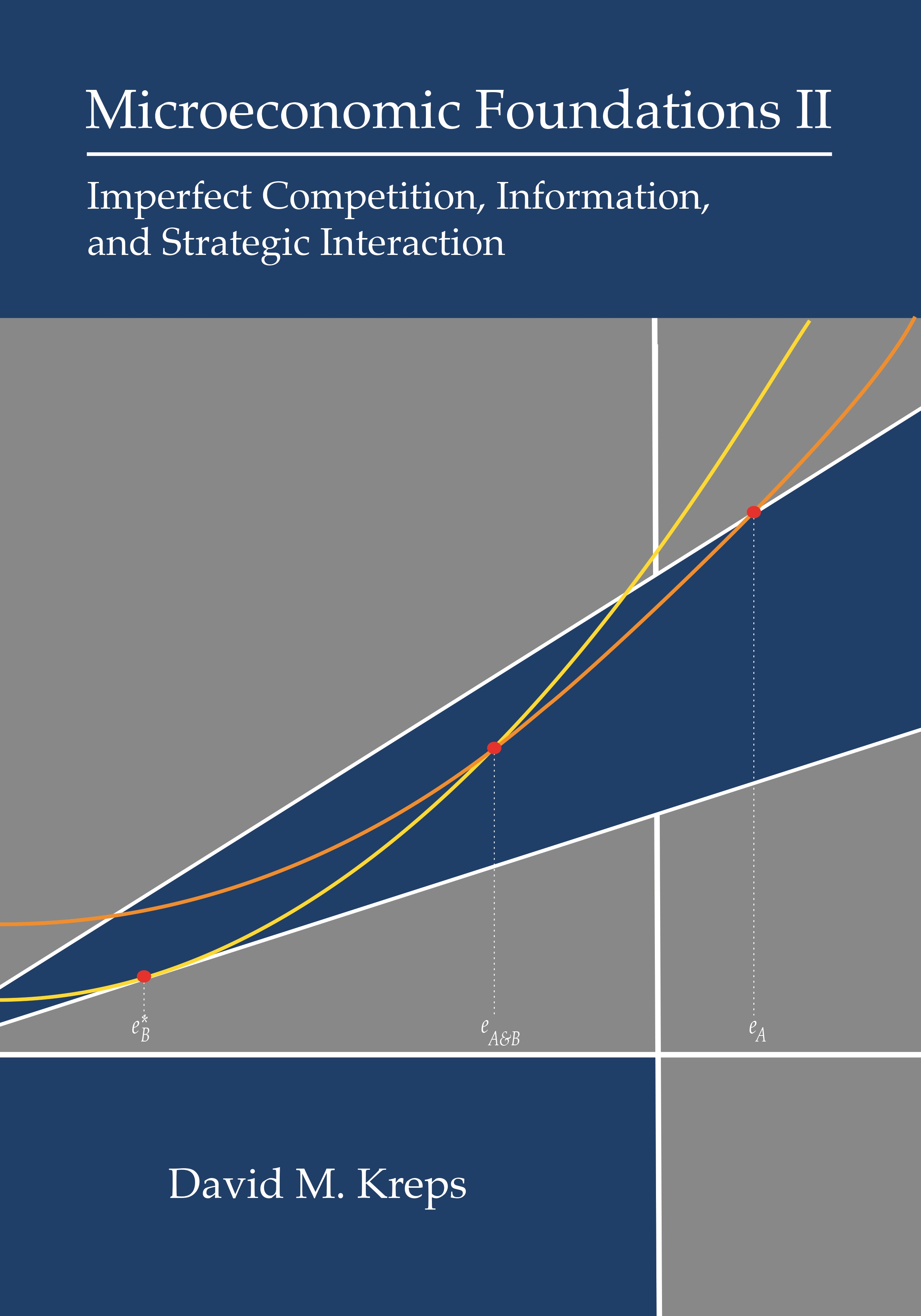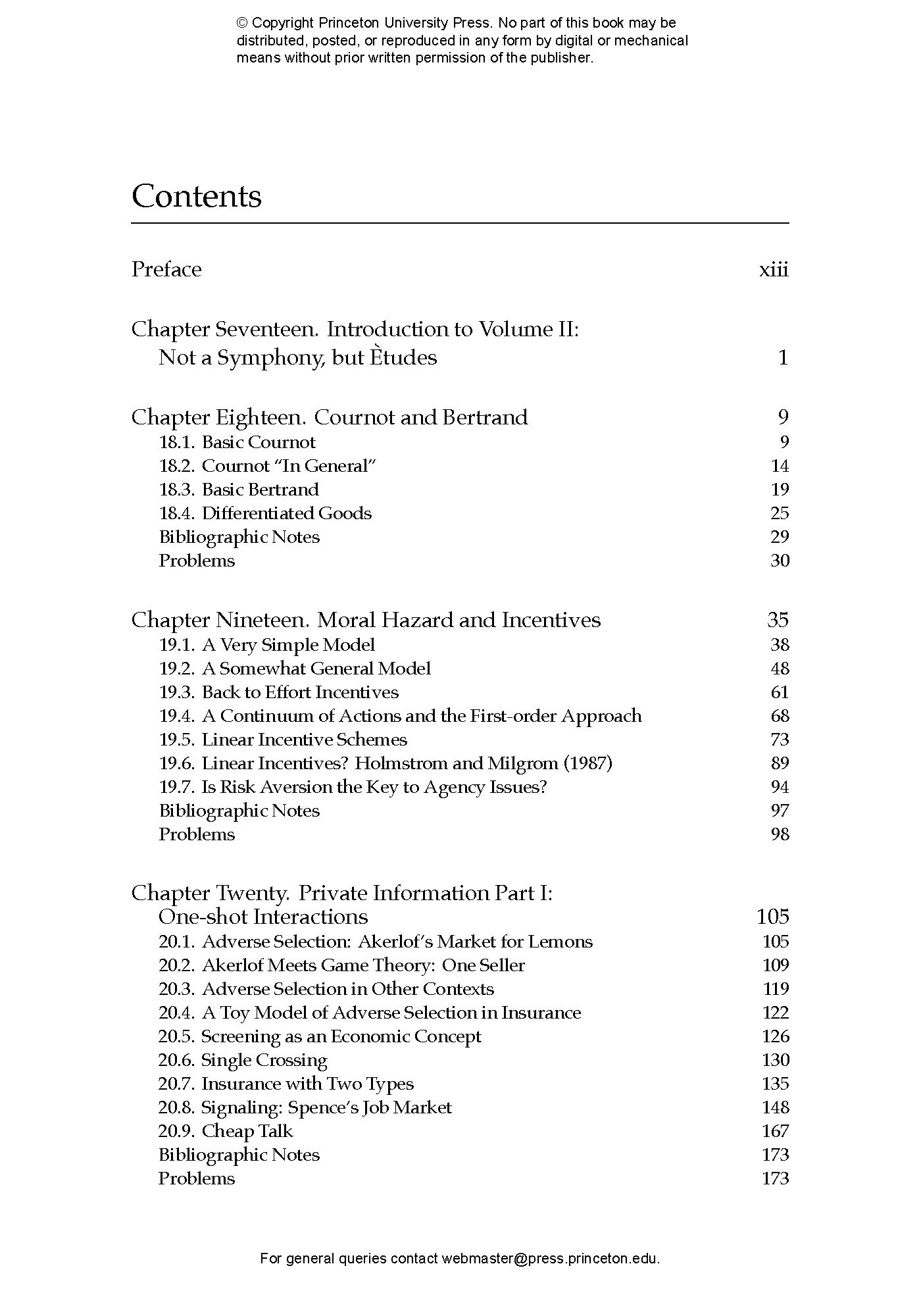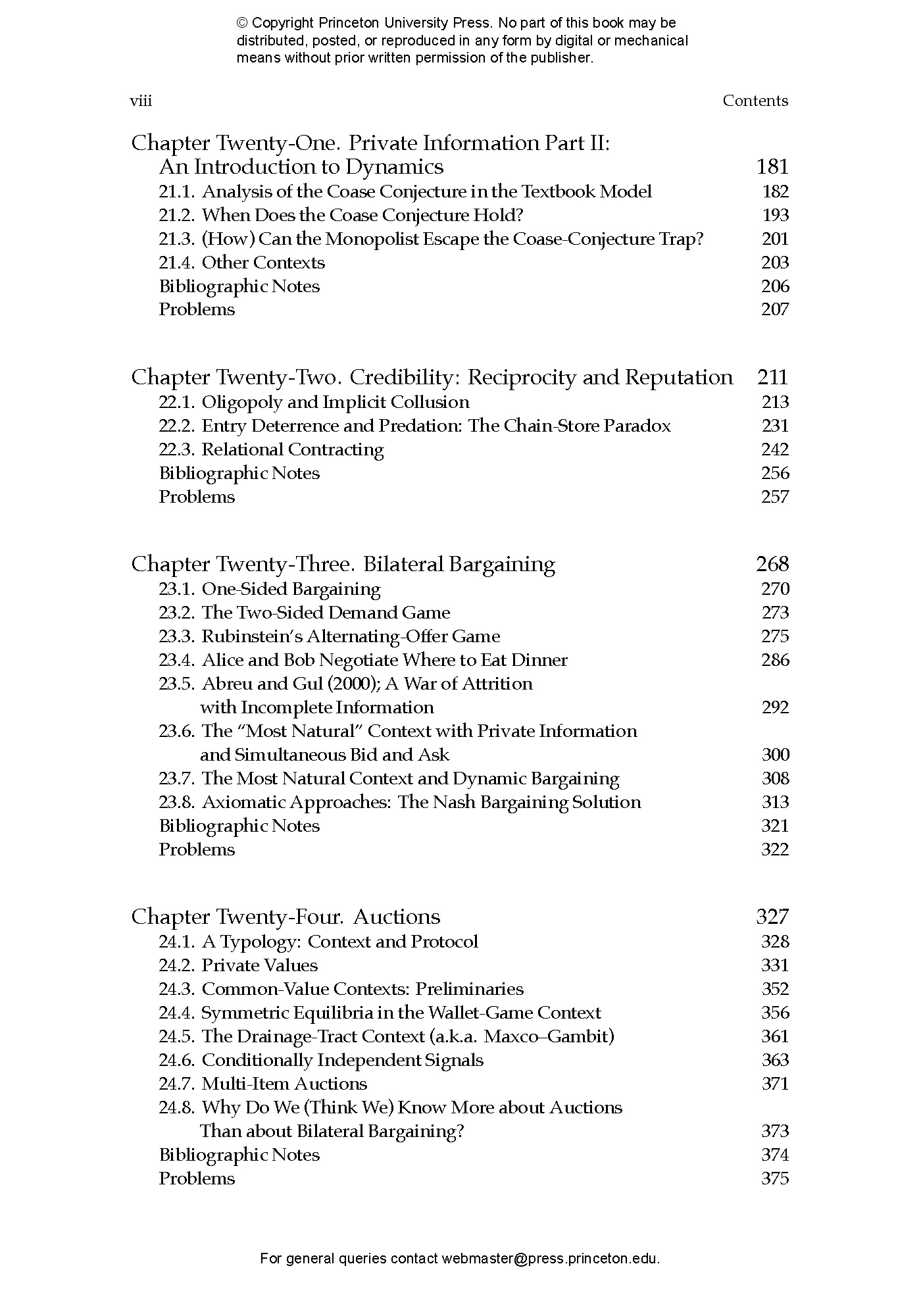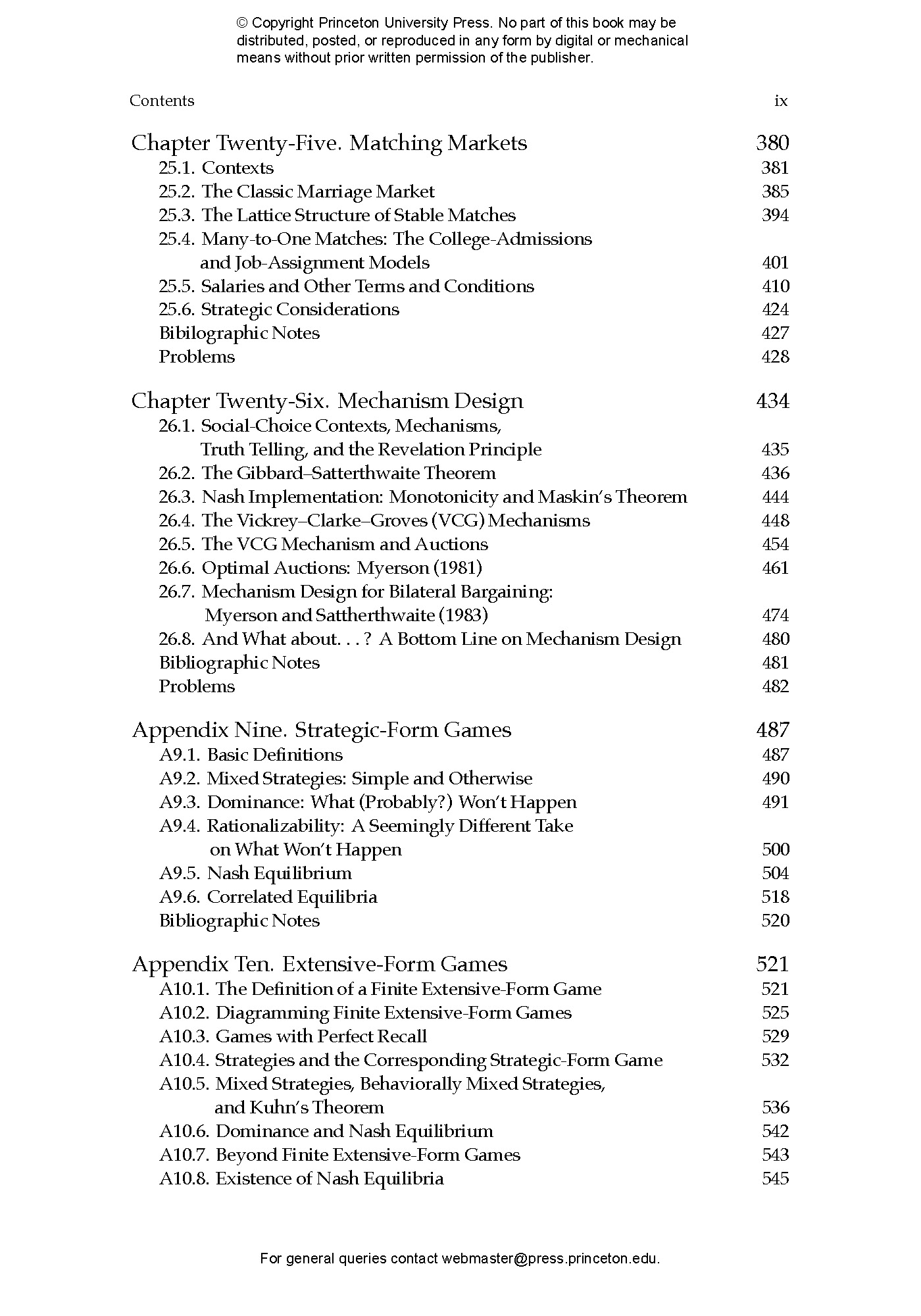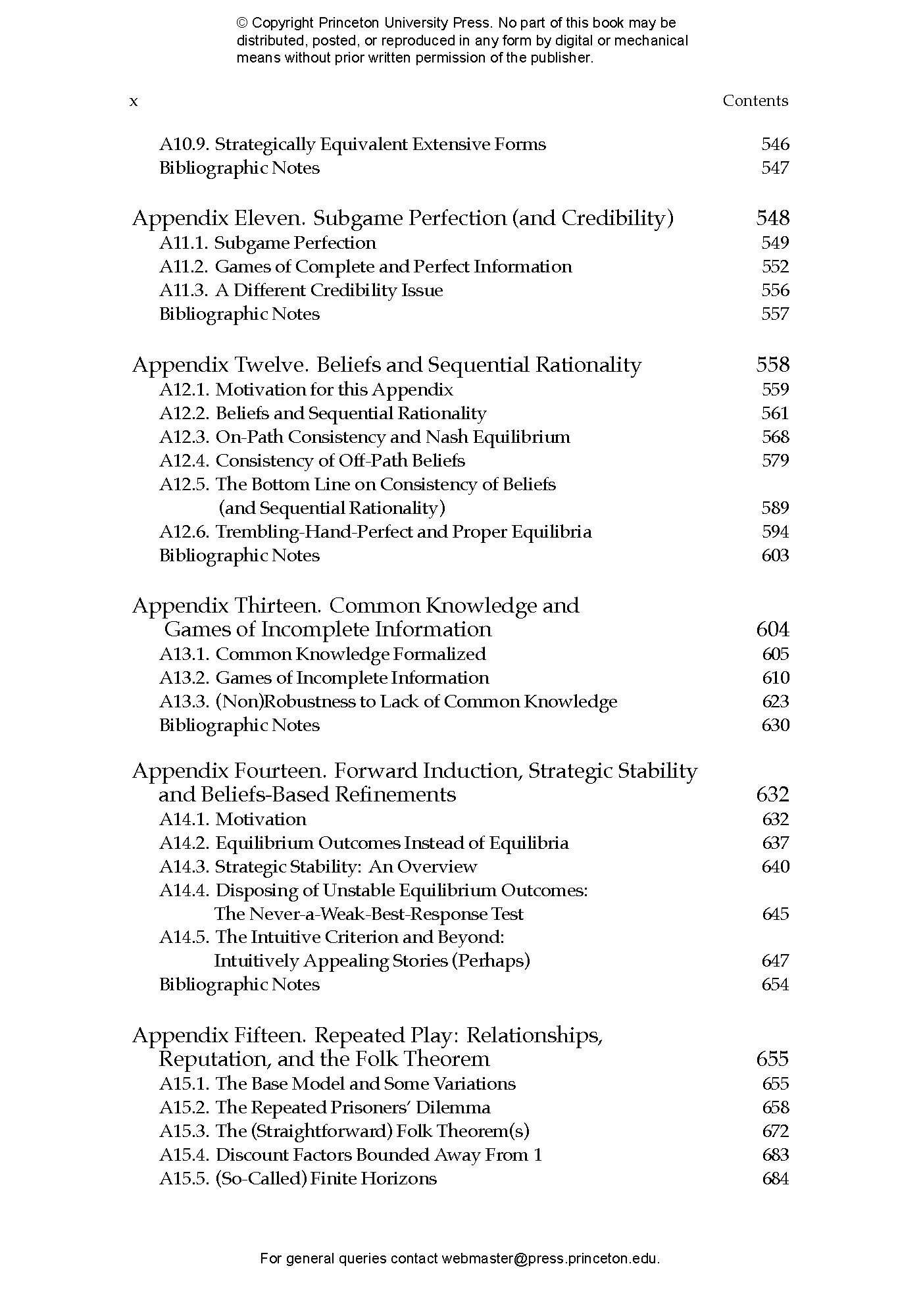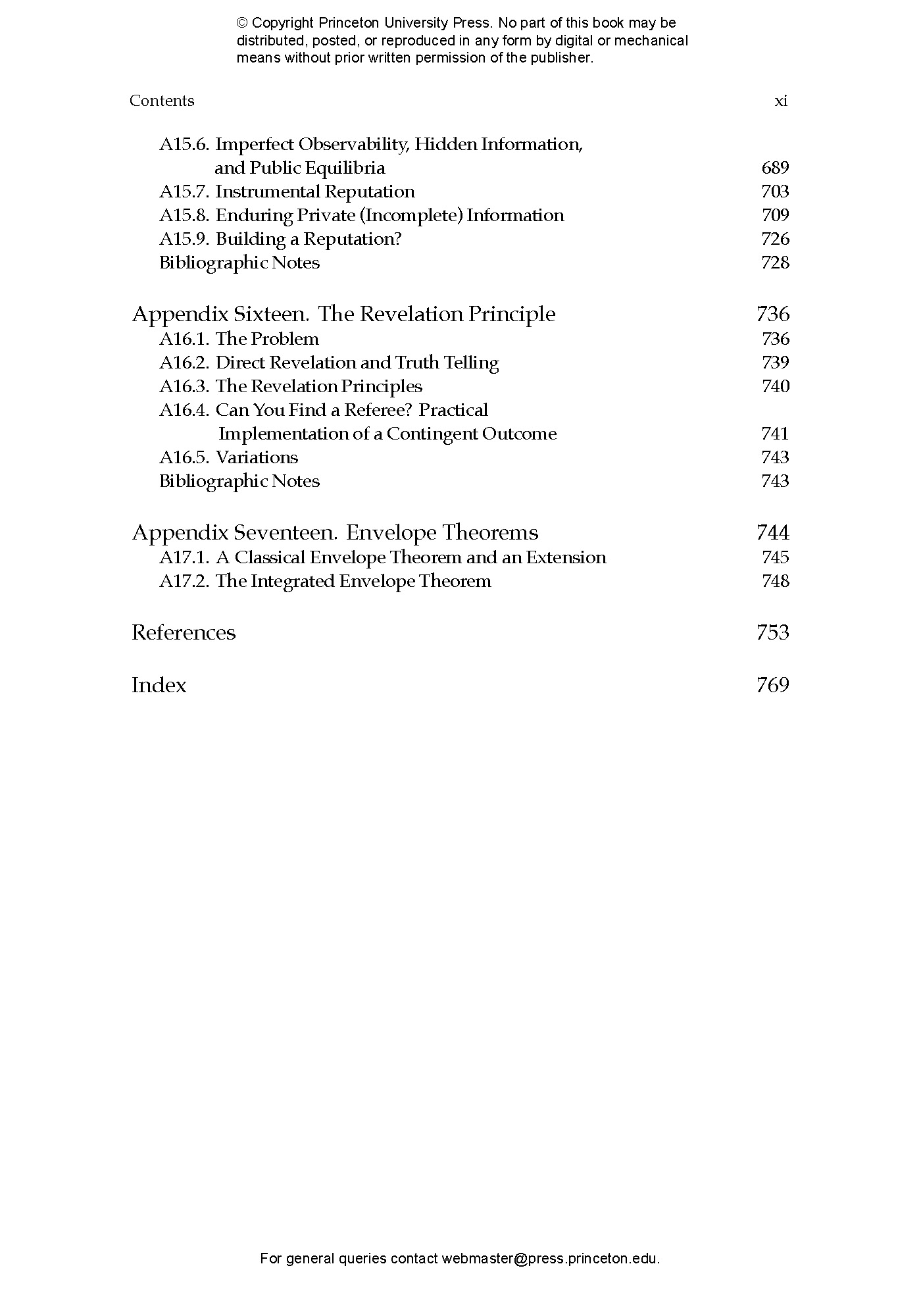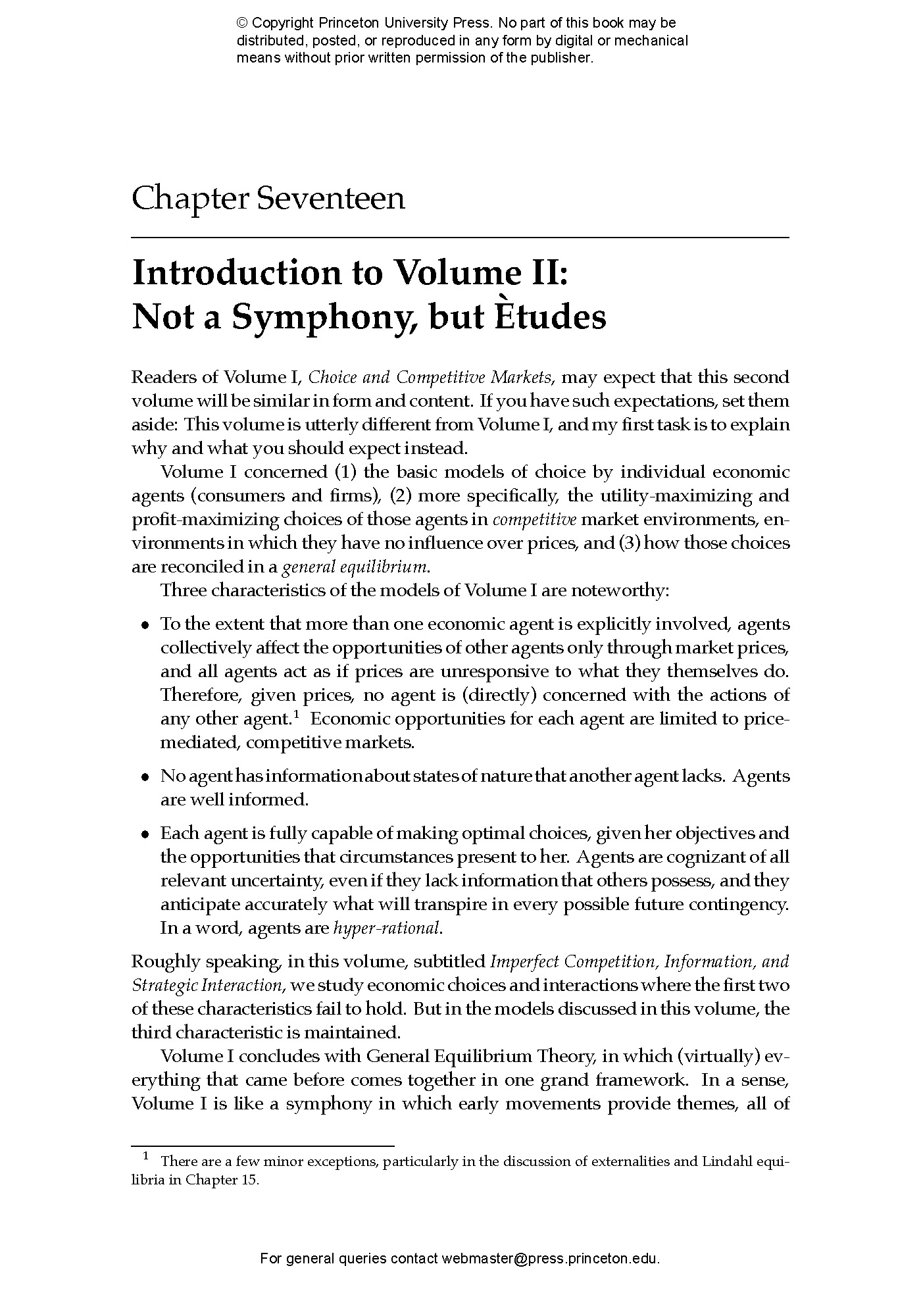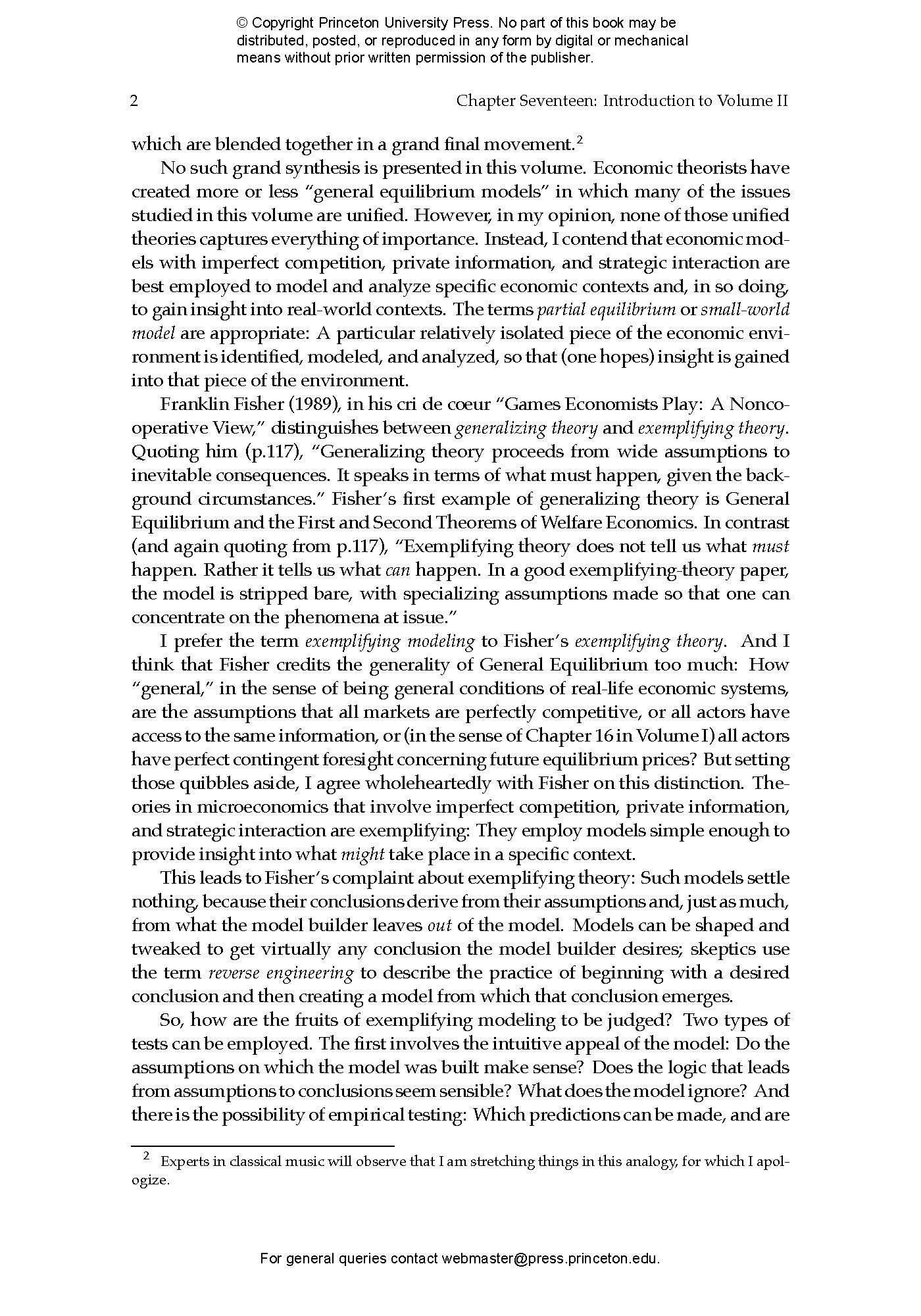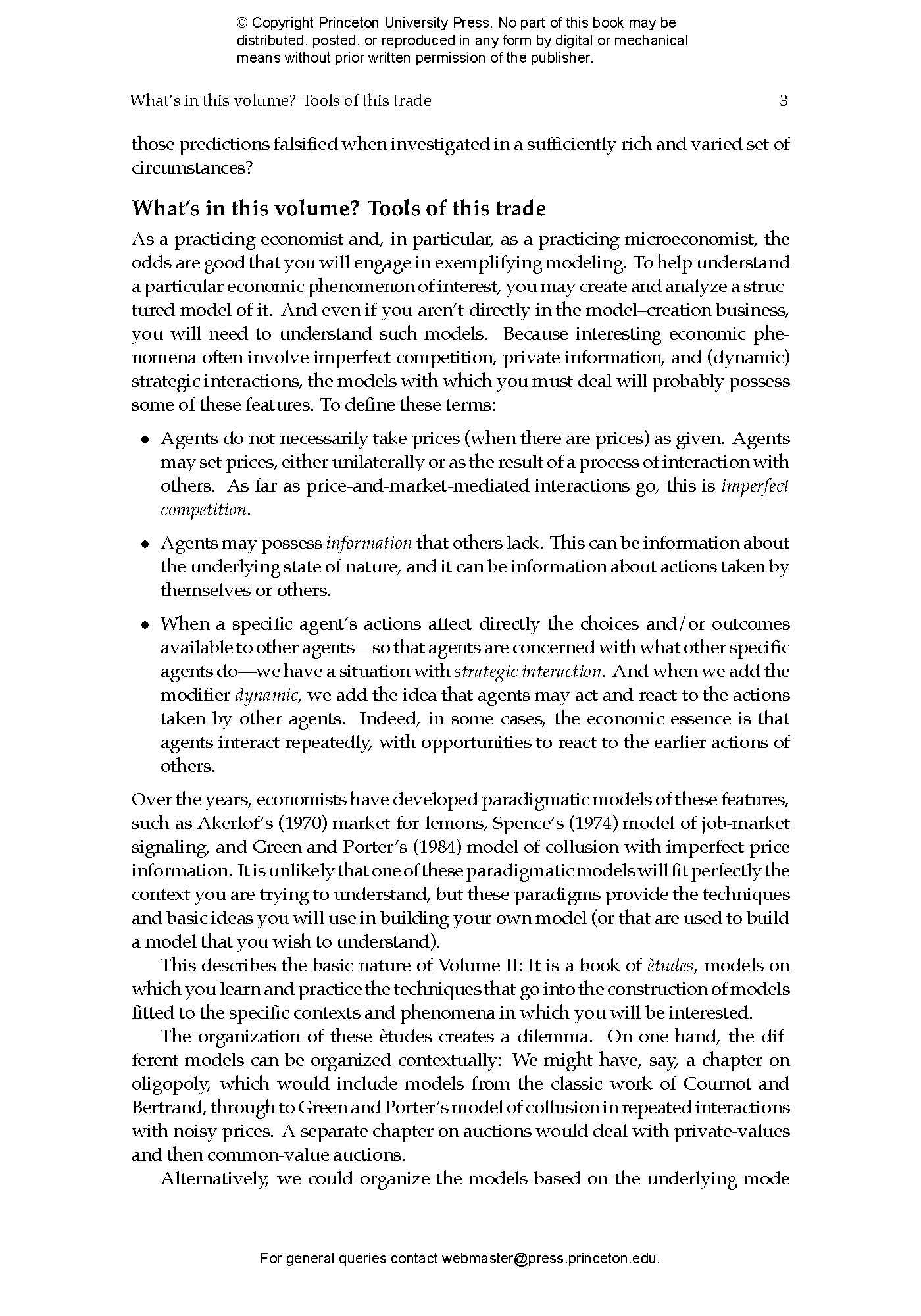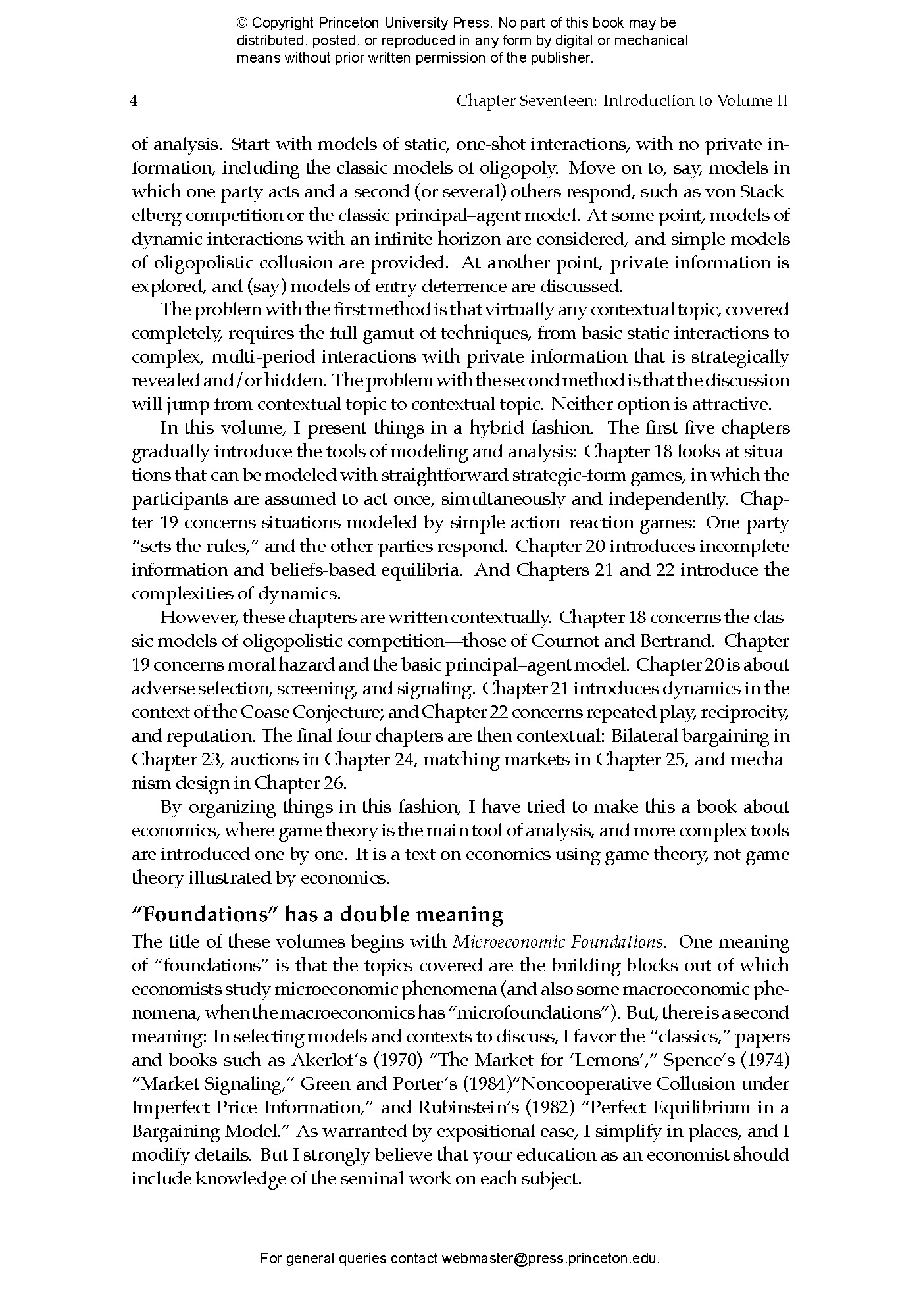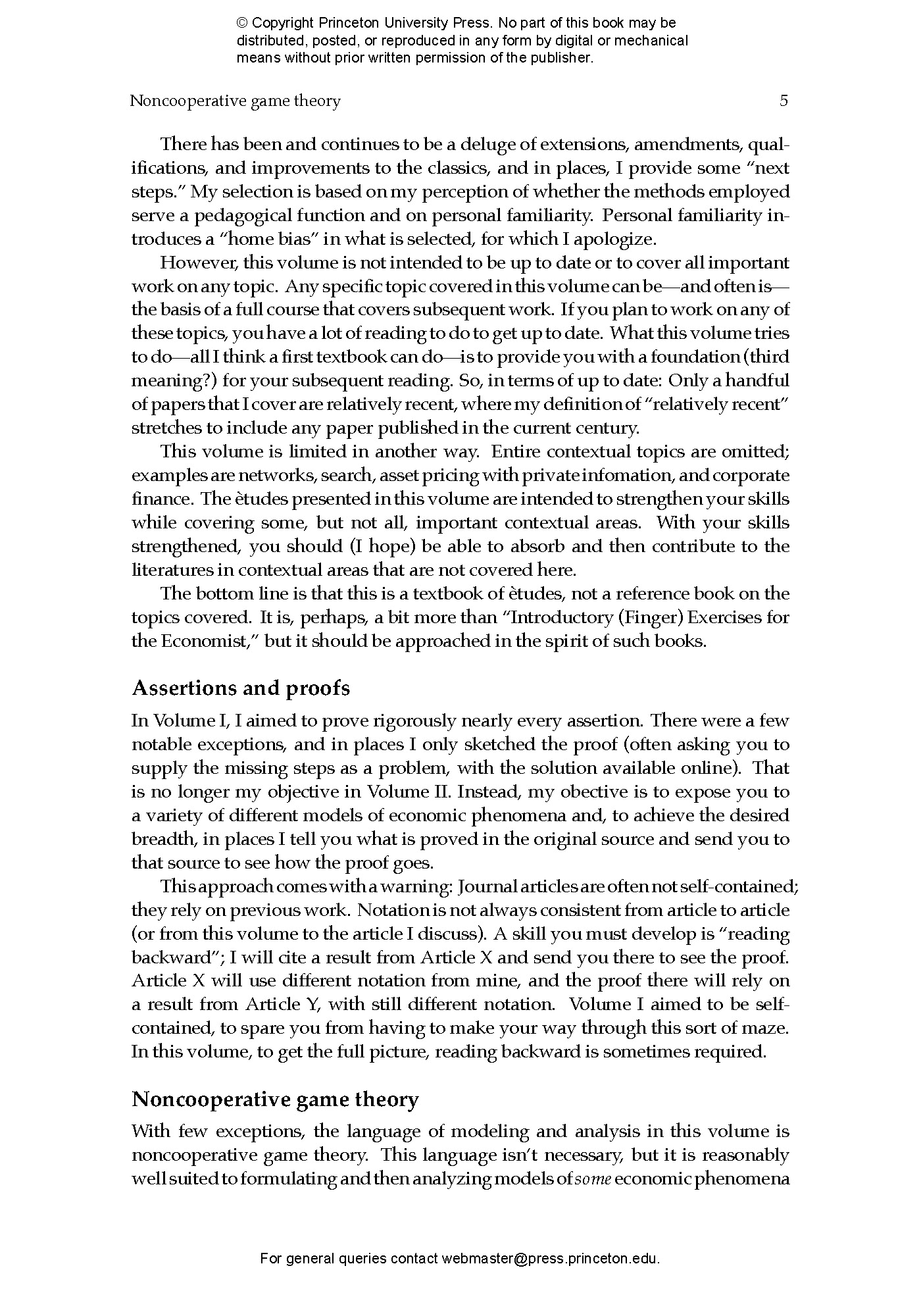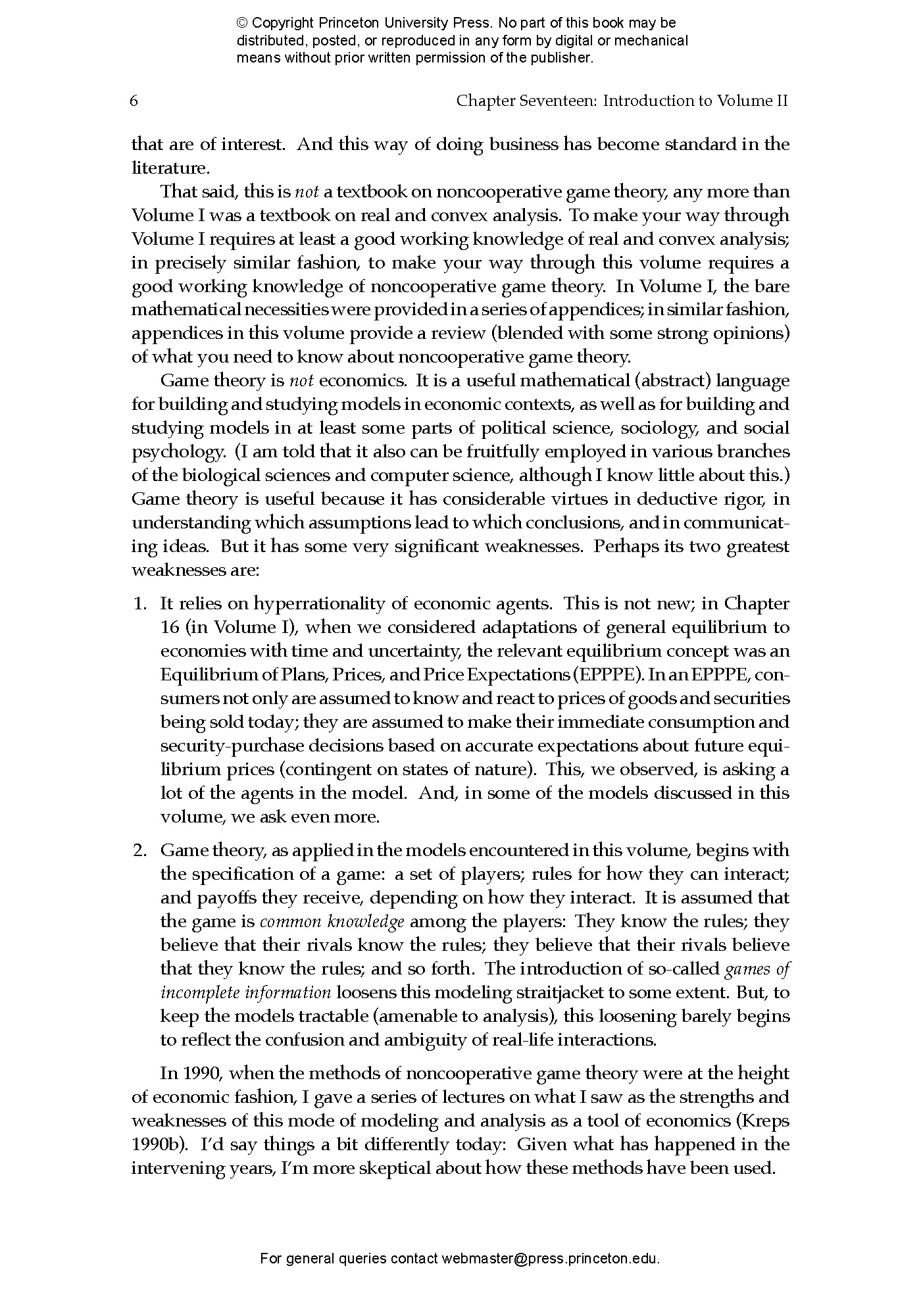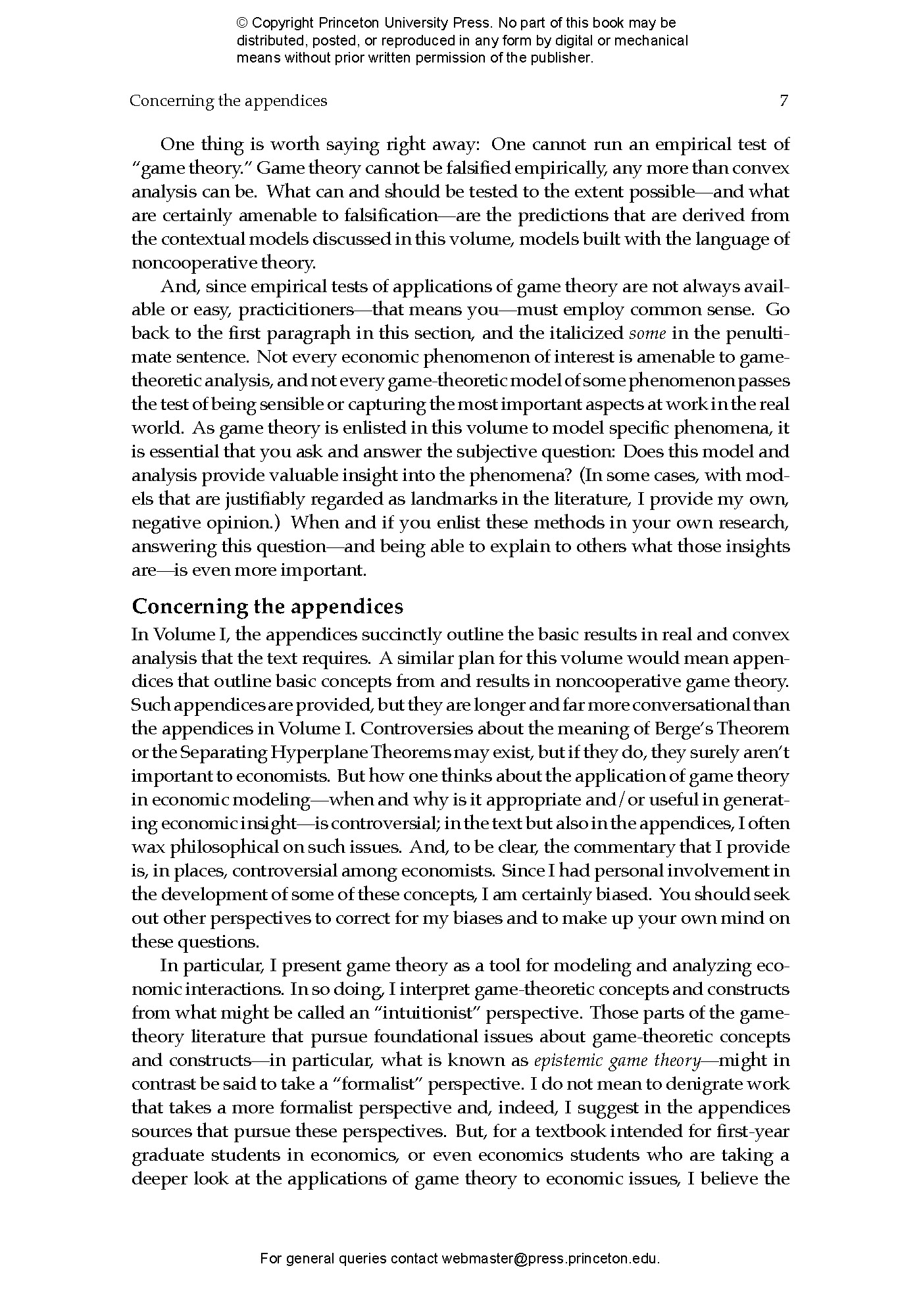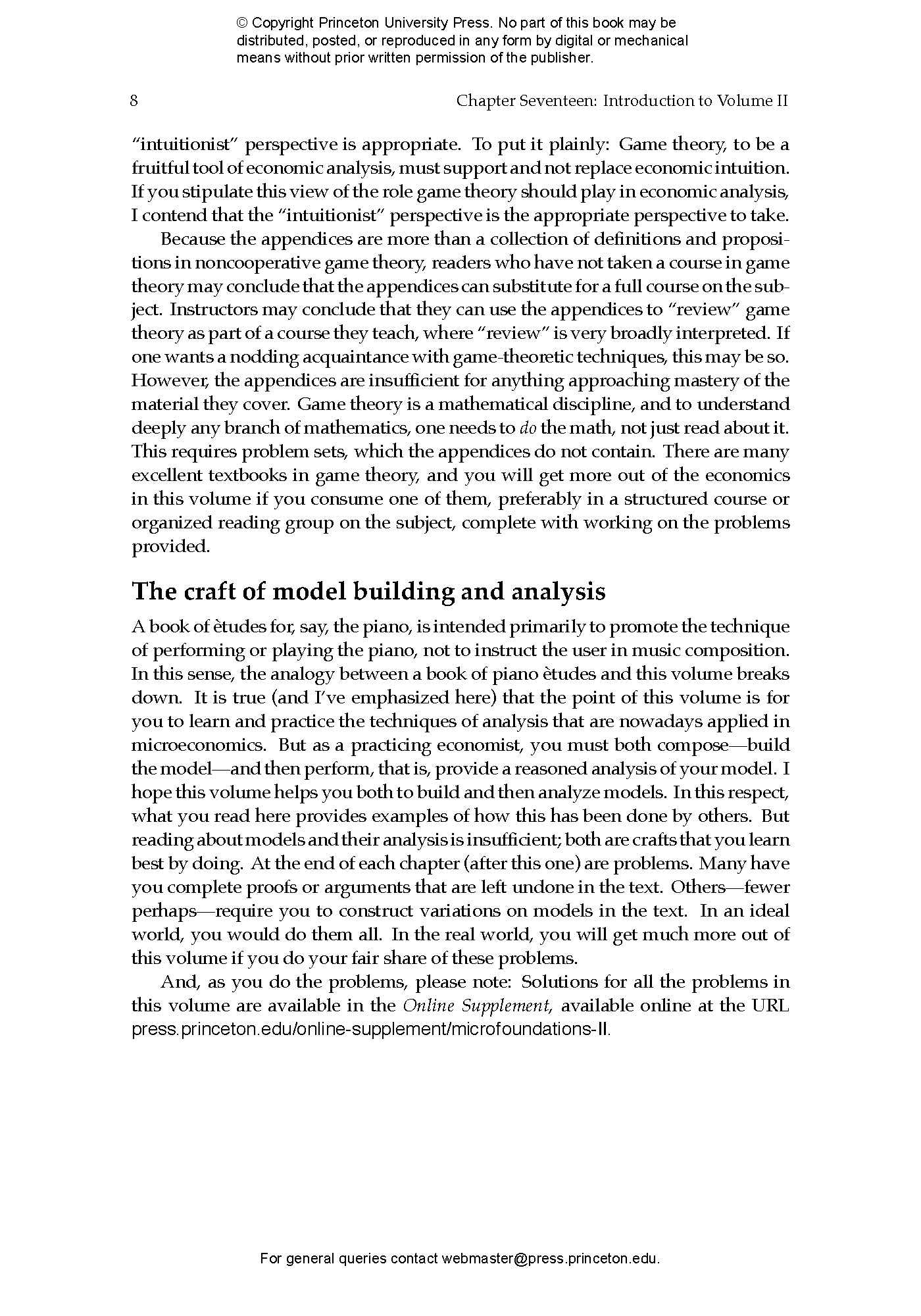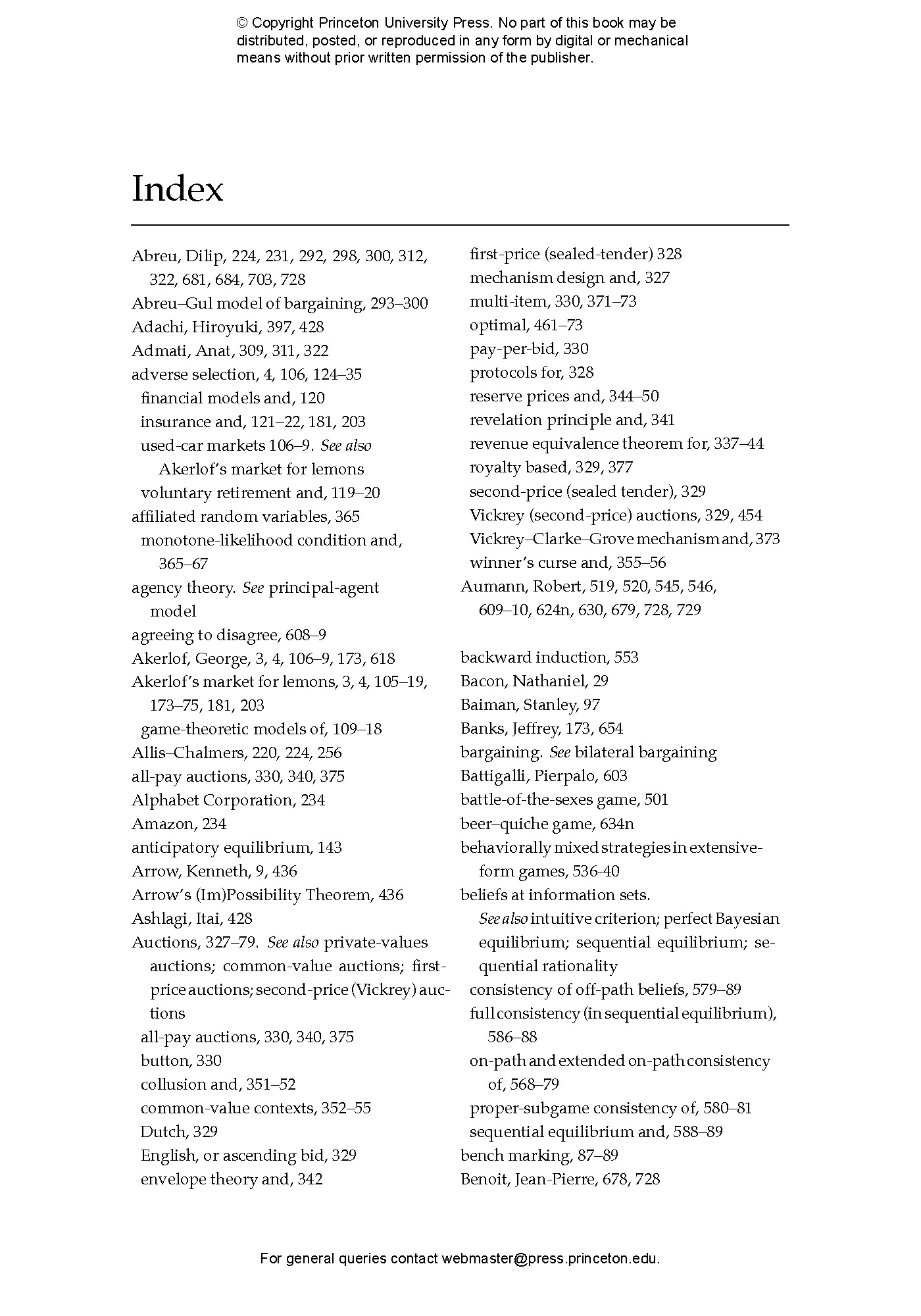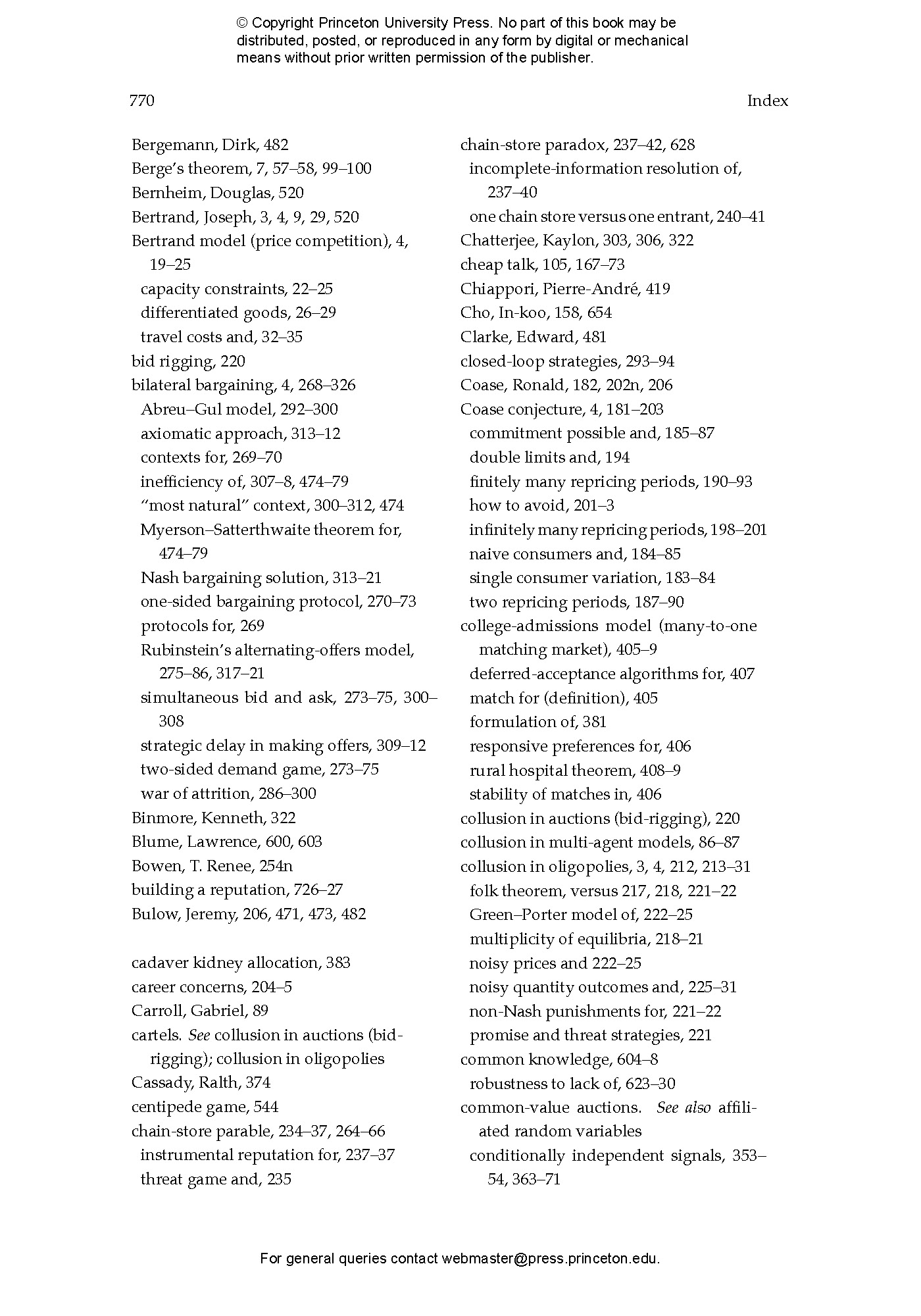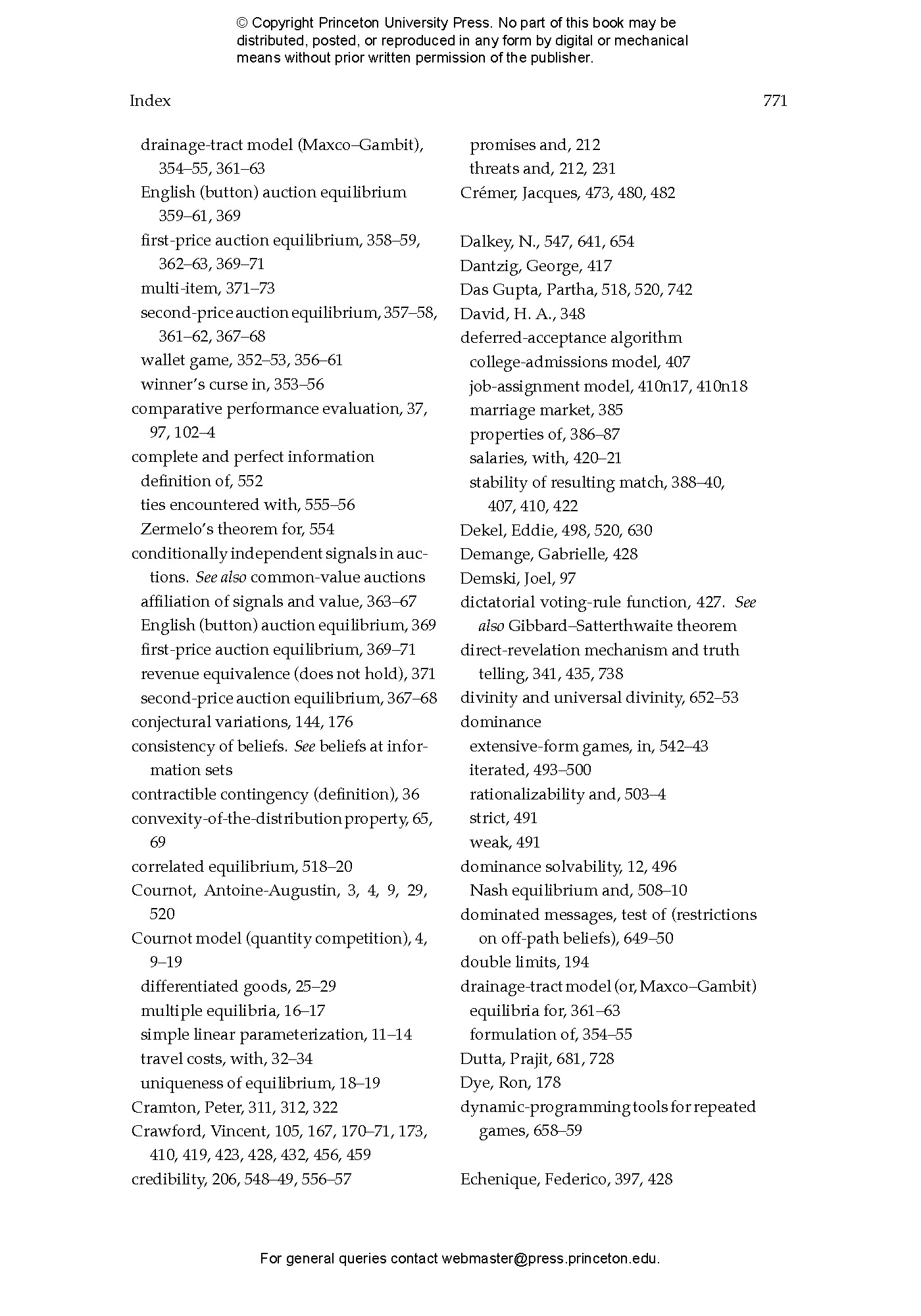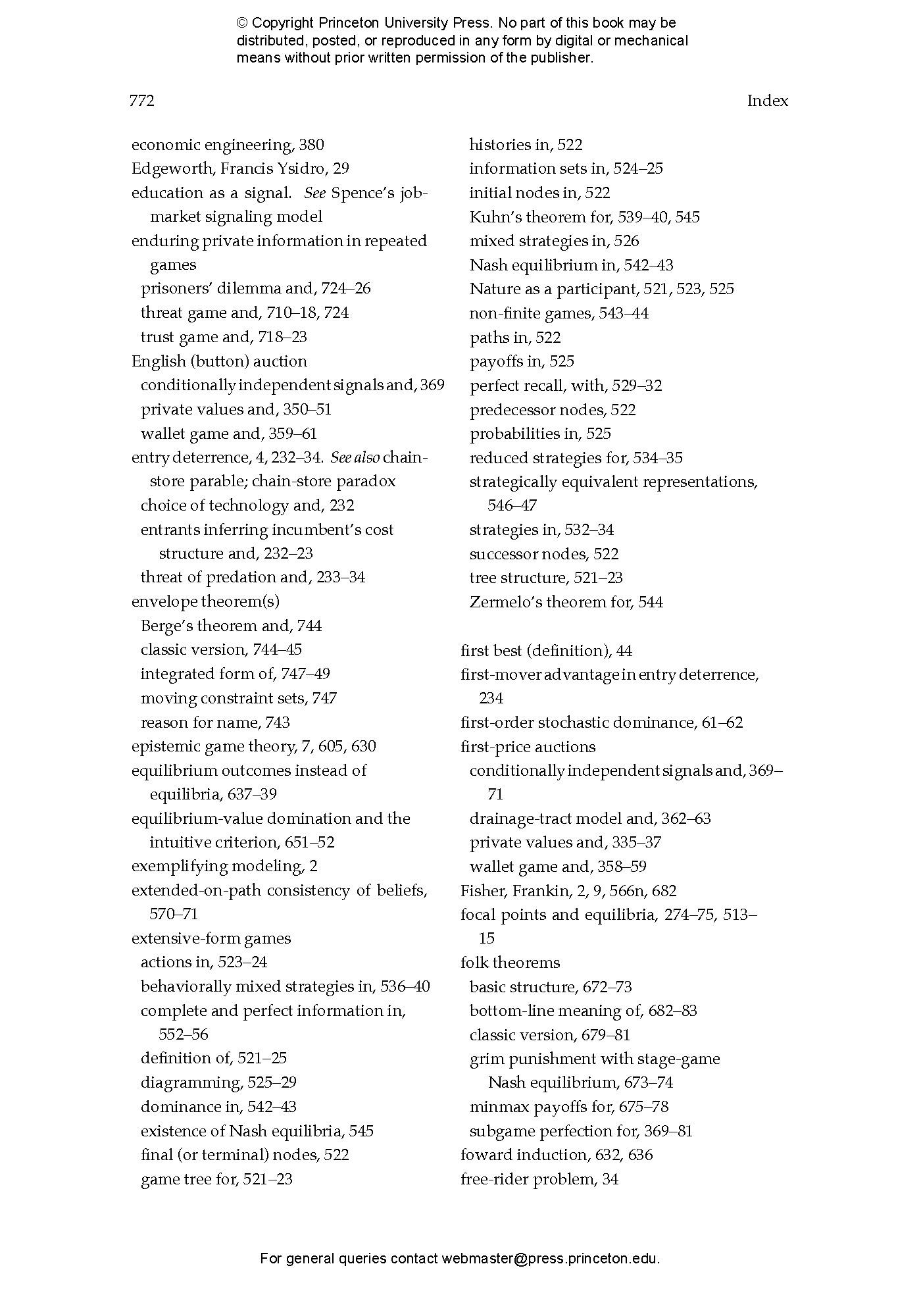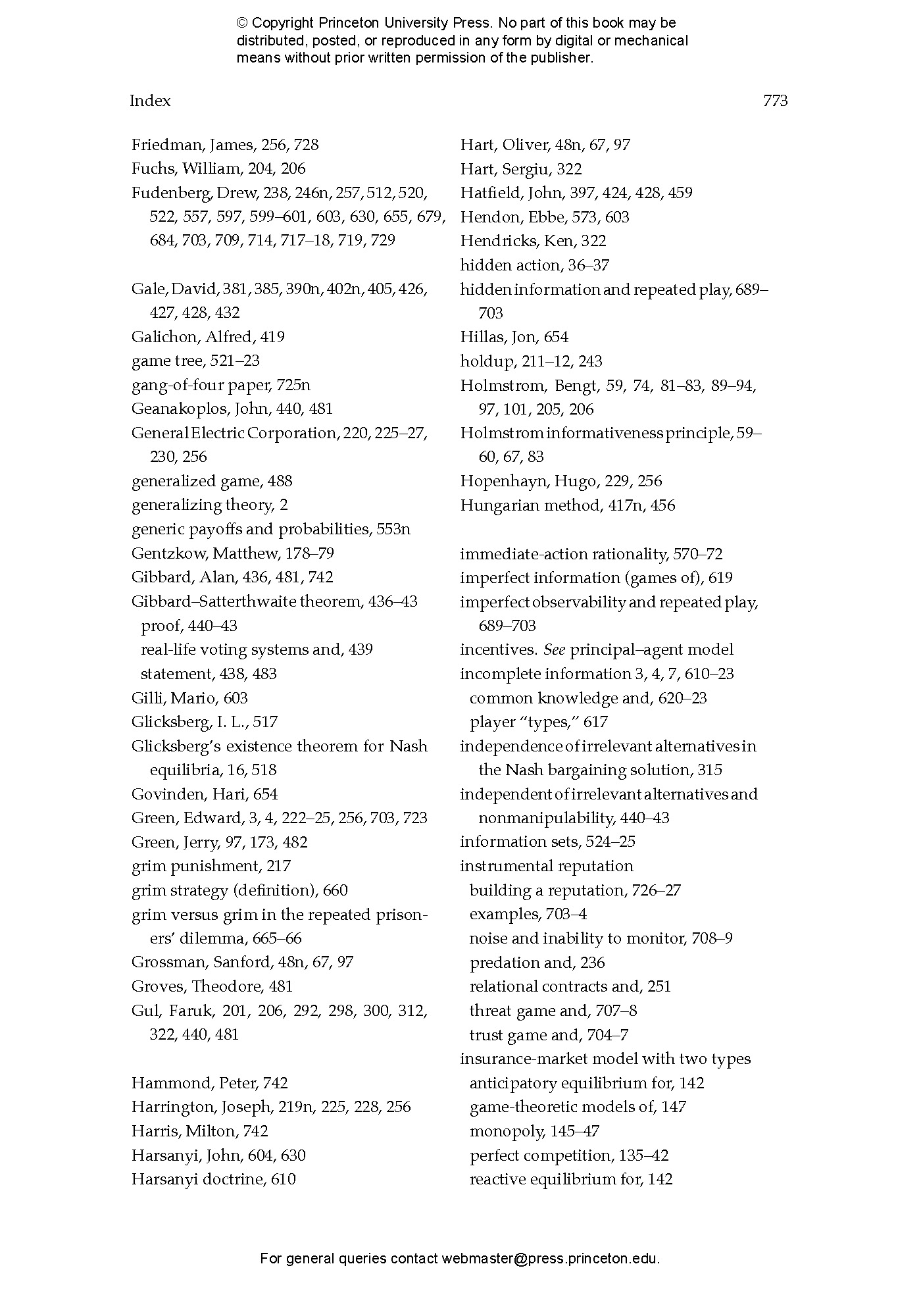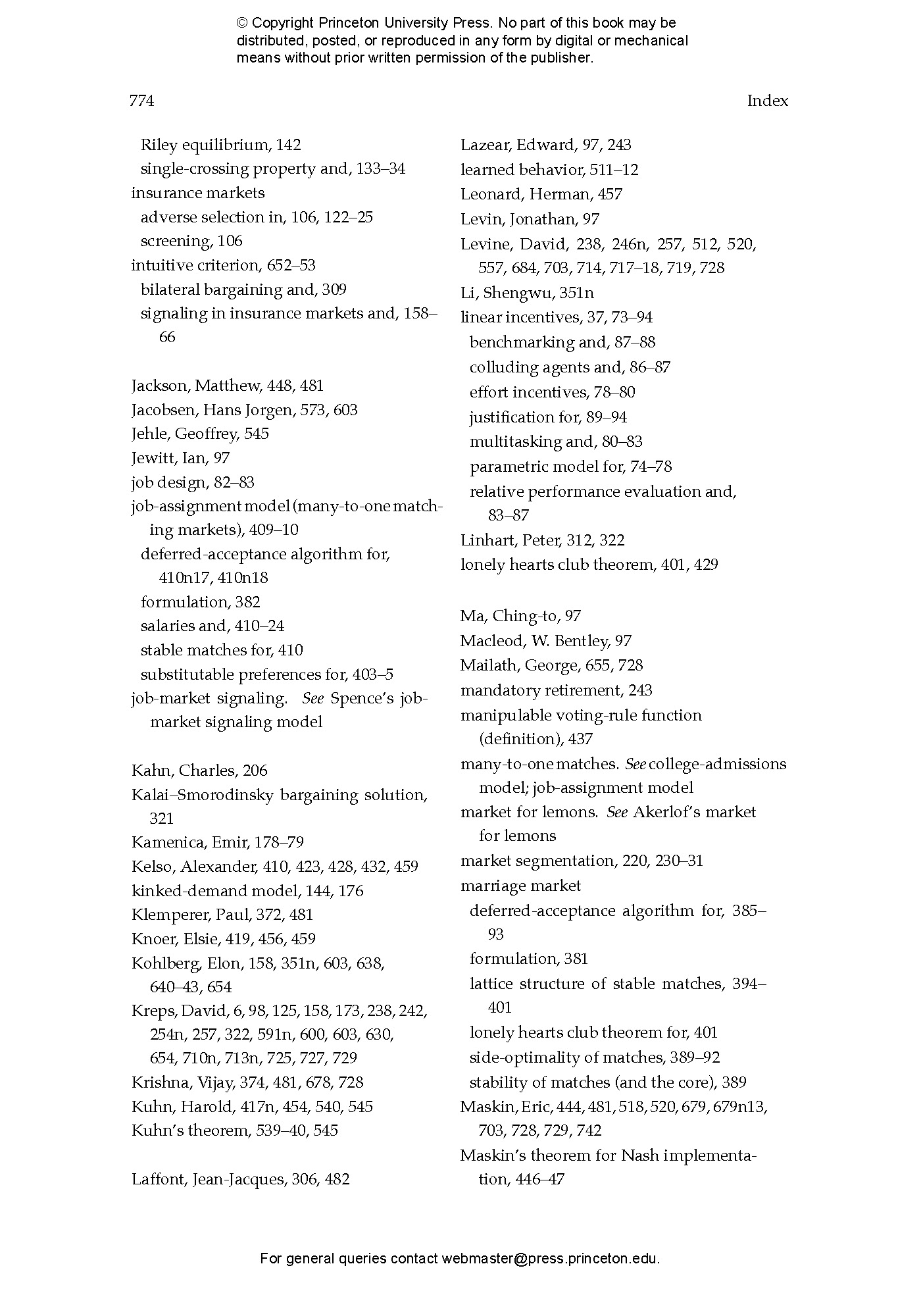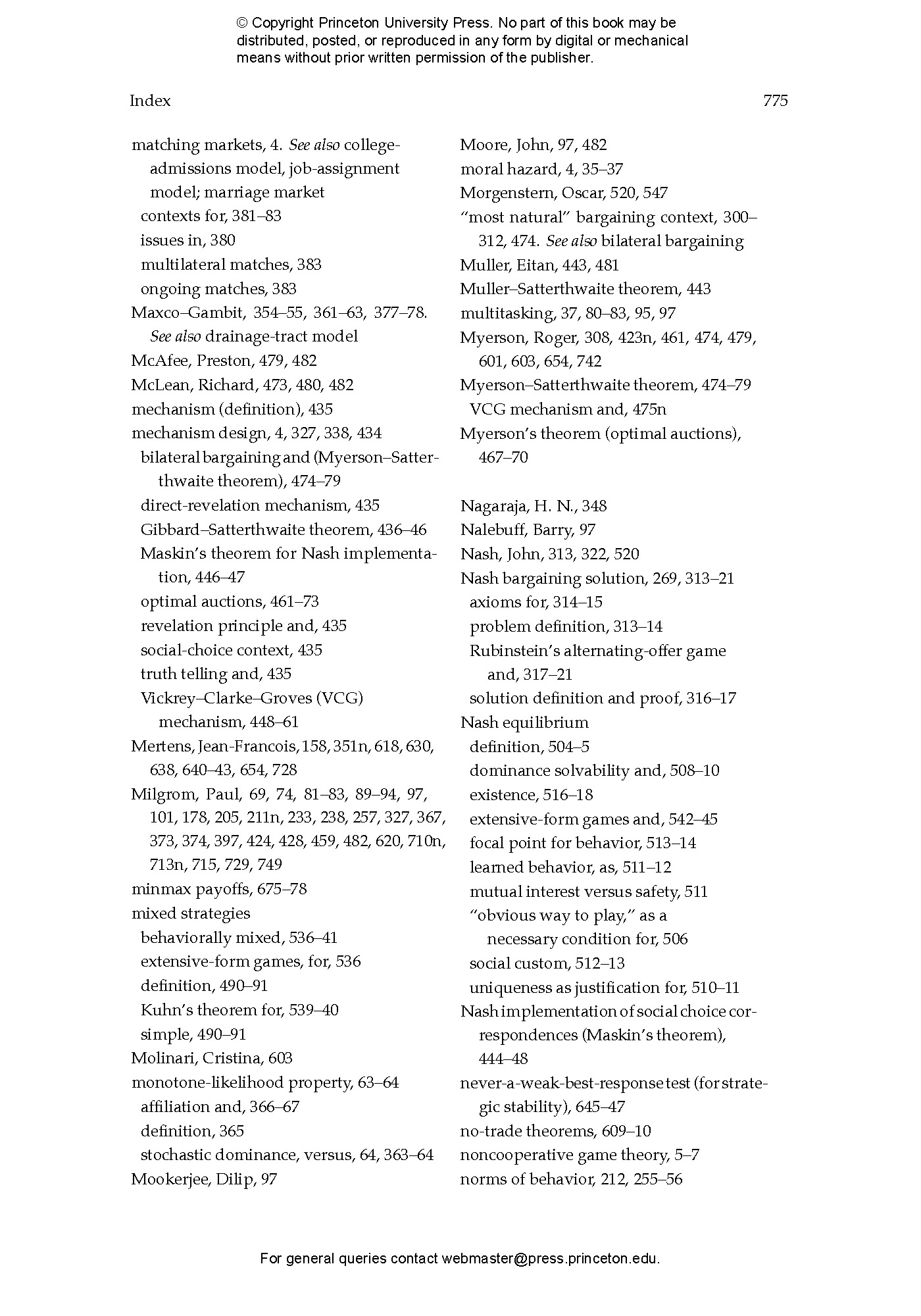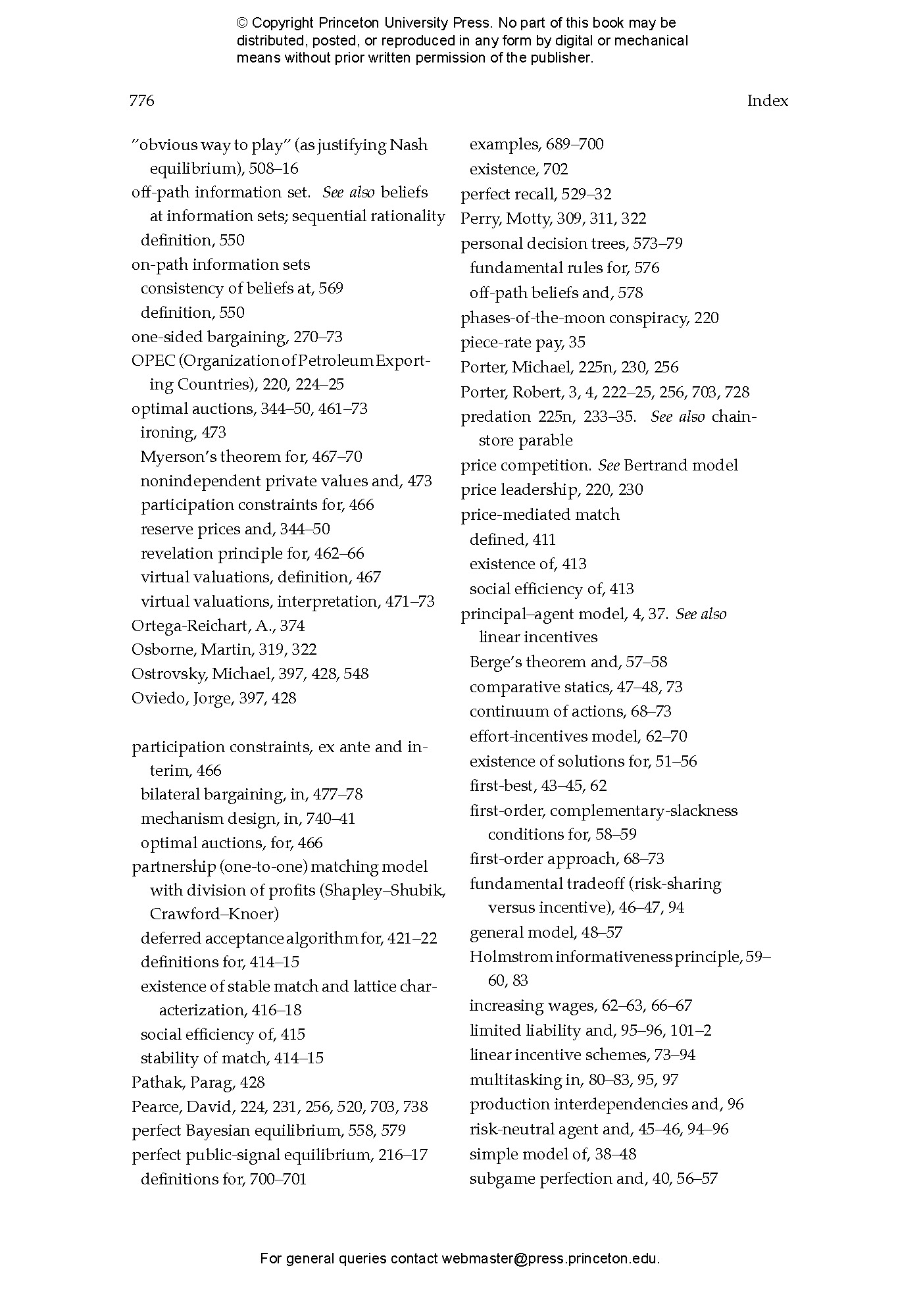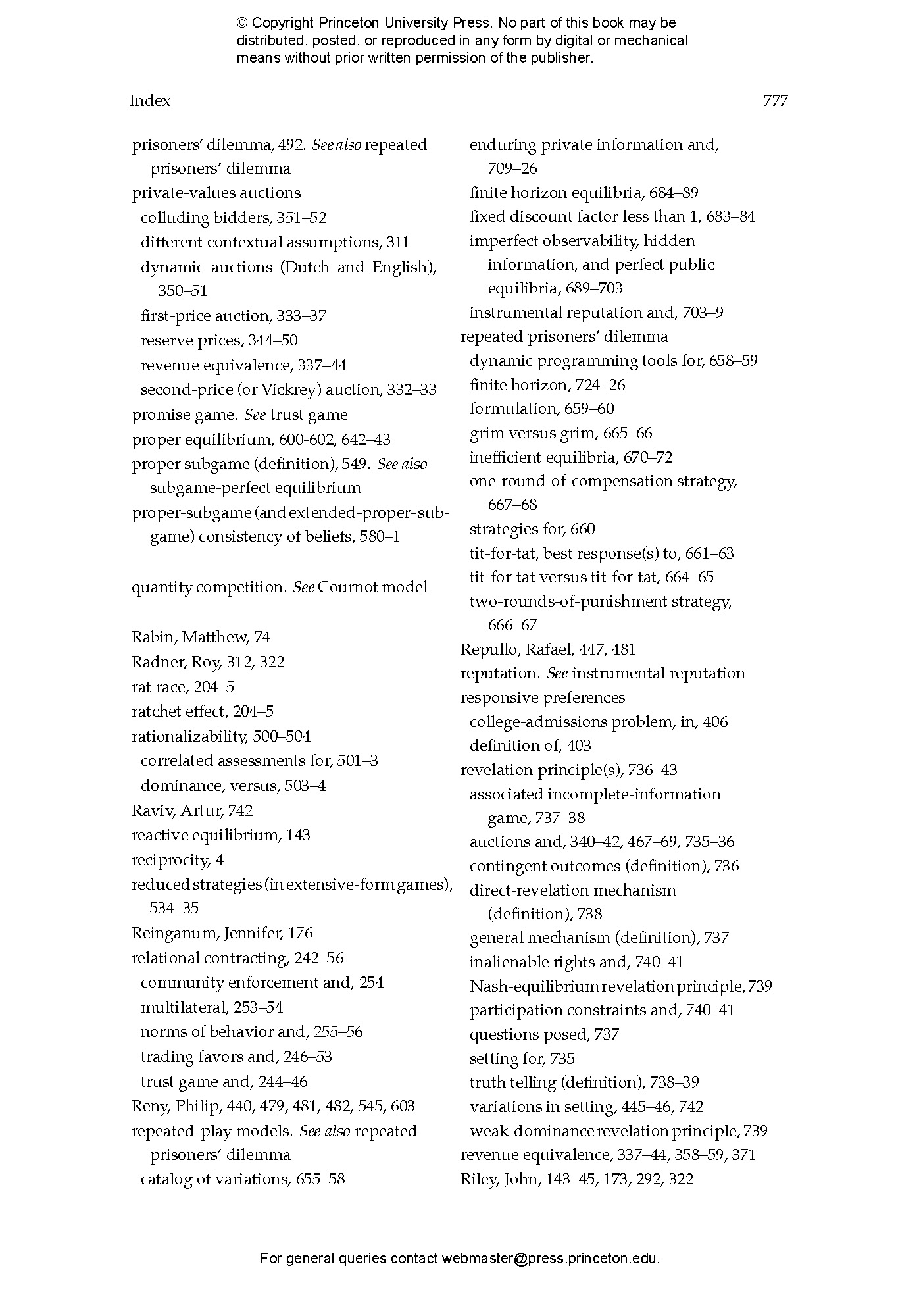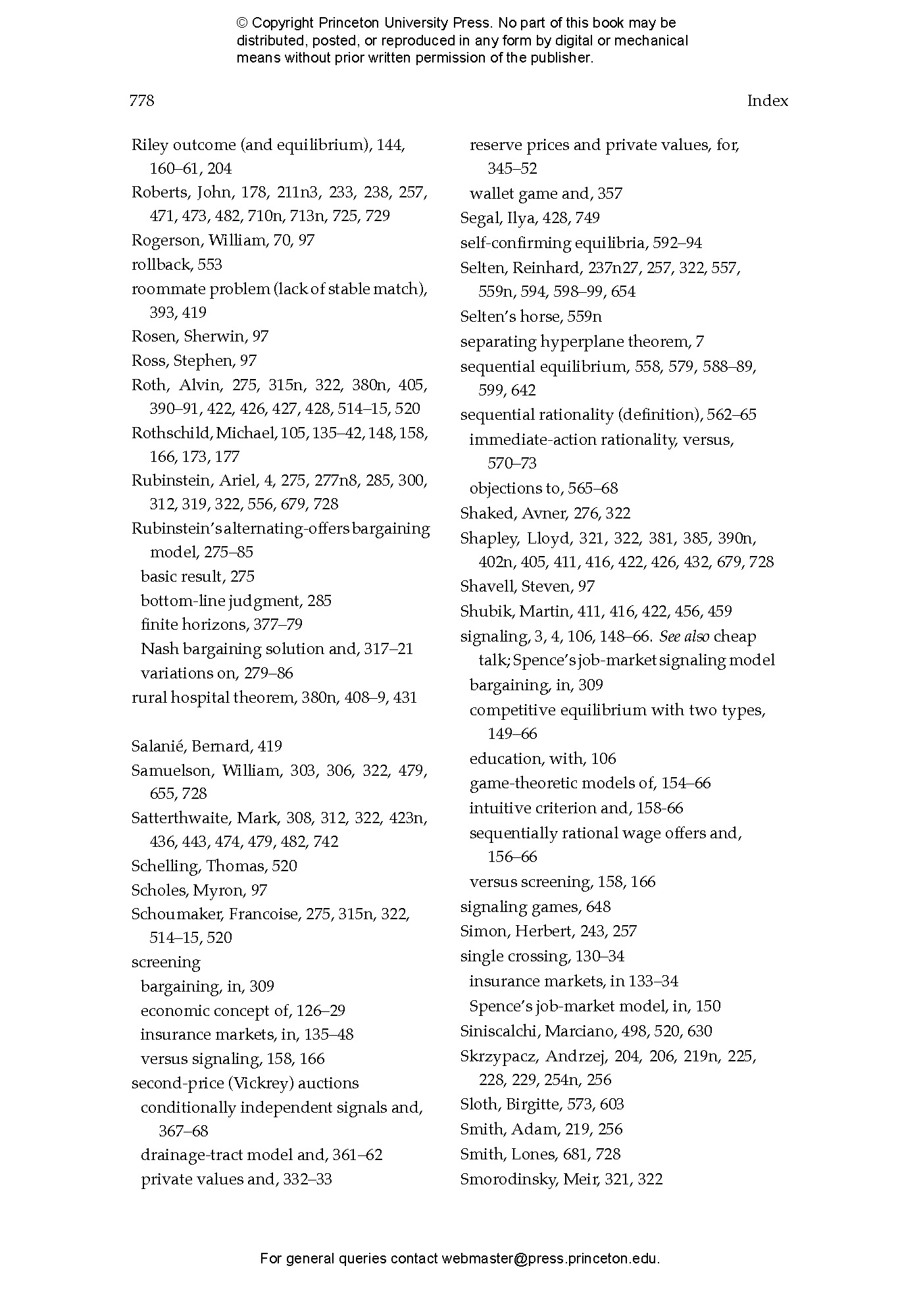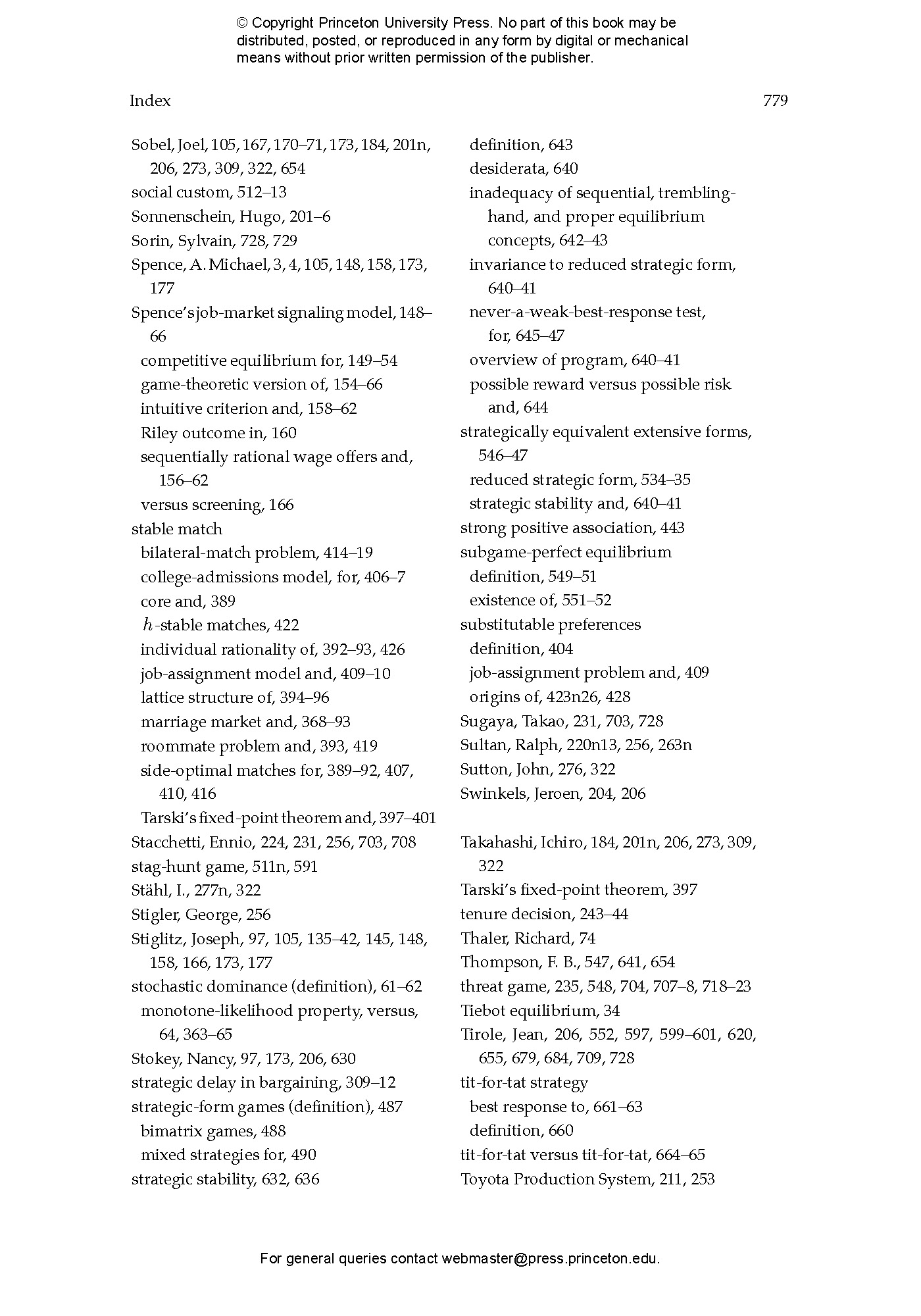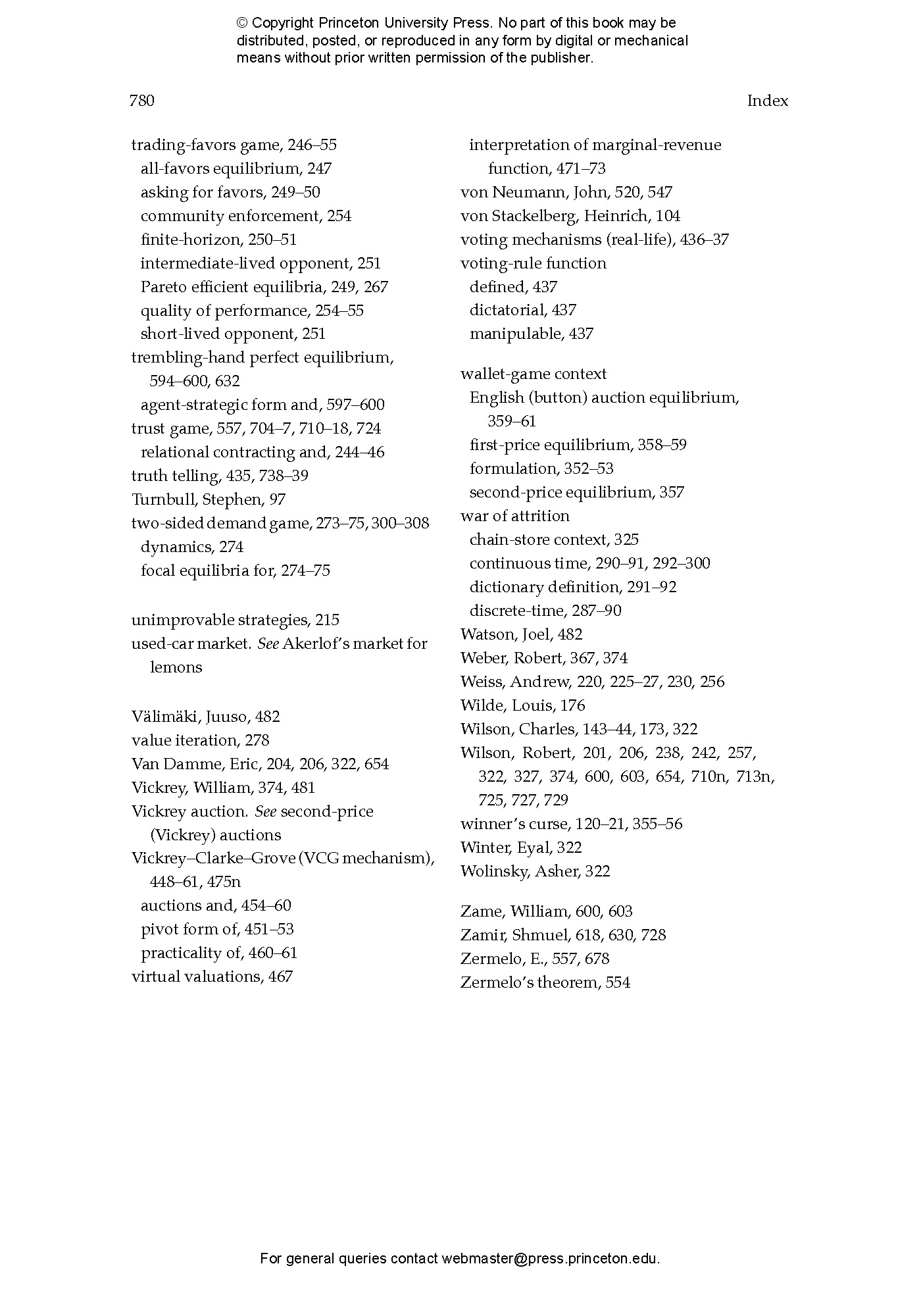Volume II of Microeconomic Foundations introduces models and methods at the center of modern microeconomic theory. In this textbook, David Kreps, a leading economic theorist, emphasizes foundational material, concentrating on seminal work that provides perspective on how and why the theory developed. Because noncooperative game theory is the chief tool of modeling and analyzing microeconomic phenomena, the book stresses the applications of game theory to economics. And throughout, it underscores why theory is most useful when it supports rather than supplants economic intuition.
- Introduces first-year graduate students to the models and methods at the core of microeconomic theory today
- Covers an extensive range of topics, including the agency theory, market signaling, relational contracting, bilateral bargaining, auctions, matching markets, and mechanism design
- Stresses the use—and misuse—of theory in studying economic phenomena and shows why theory should support, not replace, economic intuition
- Includes extensive appendices reviewing the essential concepts of noncooperative game theory, with guidance about how it should and shouldn’t be used
- Features free online supplements, including chapter outlines and overviews, solutions to all the problems in the book, and more
David M. Kreps is the Adams Distinguished Professor Emeritus of Management at Stanford University’s Graduate School of Business. He is a Distinguished Fellow of the American Economic Association, a fellow of the Econometric Society and the American Academy of Arts and Sciences, and a member of the National Academy of Sciences. His books include Microeconomic Foundations I: Choice and Competitive Markets (Princeton), Microeconomics for Managers (Princeton), The Motivation Toolkit: How to Align Your Employees’ Interests with Your Own, and The Black-Scholes-Merton Model as an Idealization of Discrete-Time Economies.
- Preface
- Chapter Seventeen. Introduction to Volume II: Not a Symphony, but Ètudes
- Chapter Eighteen. Cournot and Bertrand
- 18.1. Basic Cournot
- 18.2. Cournot “In General”
- 18.3. Basic Bertrand
- 18.4. Differentiated Goods
- Bibliographic Notes
- Problems
- Chapter Nineteen. Moral Hazard and Incentives
- 19.1. A Very Simple Model
- 19.2. A Somewhat General Model
- 19.3. Back to Effort Incentives
- 19.4. A Continuum of Actions and the First-order Approach
- 19.5. Linear Incentive Schemes
- 19.6. Linear Incentives? Holmstrom and Milgrom (1987)
- 19.7. Is Risk Aversion the Key to Agency Issues?
- Bibliographic Notes
- Problems
- Chapter Twenty. Private Information Part I: One-shot Interactions
- 20.1. Adverse Selection: Akerlof’s Market for Lemons
- 20.2. Akerlof Meets Game Theory: One Seller
- 20.3. Adverse Selection in Other Contexts
- 20.4. A Toy Model of Adverse Selection in Insurance
- 20.5. Screening as an Economic Concept
- 20.6. Single Crossing
- 20.7. Insurance with Two Types
- 20.8. Signaling: Spence’s Job Market
- 20.9. Cheap Talk
- Bibliographic Notes
- Problems
- Chapter Twenty-One. Private Information Part II: An Introduction to Dynamics
- 21.1. Analysis of the Coase Conjecture in the Textbook Model
- 21.2. When Does the Coase Conjecture Hold?
- 21.3. (How) Can the Monopolist Escape the Coase-Conjecture Trap?
- 21.4. Other Contexts
- Bibliographic Notes
- Problems
- Chapter Twenty-Two. Credibility: Reciprocity and Reputation
- 22.1. Oligopoly and Implicit Collusion
- 22.2. Entry Deterrence and Predation: The Chain-Store Paradox
- 22.3. Relational Contracting
- Bibliographic Notes
- Problems
- Chapter Twenty-Three. Bilateral Bargaining
- 23.1. One-Sided Bargaining
- 23.2. The Two-Sided Demand Game
- 23.3. Rubinstein’s Alternating-Offer Game
- 23.4. Alice and Bob Negotiate Where to Eat Dinner
- 23.5. Abreu and Gul (2000); A War of Attrition with Incomplete Information
- 23.6. The “Most Natural” Context with Private Information and Simultaneous Bid and Ask
- 23.7. The Most Natural Context and Dynamic Bargaining
- 23.8. Axiomatic Approaches: The Nash Bargaining Solution
- Bibliographic Notes
- Problems
- Chapter Twenty-Four. Auctions
- 24.1. A Typology: Context and Protocol
- 24.2. Private Values
- 24.3. Common-Value Contexts: Preliminaries
- 24.4. Symmetric Equilibria in the Wallet-Game Context
- 24.5. The Drainage-Tract Context (a.k.a. Maxco–Gambit)
- 24.6. Conditionally Independent Signals
- 24.7. Multi-Item Auctions
- 24.8. Why Do We (Think We) Know More about Auctions Than about Bilateral Bargaining?
- Bibliographic Notes
- Problems
- Chapter Twenty-Five. Matching Markets
- 25.1. Contexts
- 25.2. The Classic Marriage Market
- 25.3. The Lattice Structure of Stable Matches
- 25.4. Many-to-One Matches: The College-Admissions and Job-Assignment Models
- 25.5. Salaries and Other Terms and Conditions
- 25.6. Strategic Considerations
- Bibilographic Notes
- Problems
- Chapter Twenty-Six. Mechanism Design
- 26.1. Social-Choice Contexts, Mechanisms, Truth Telling, and the Revelation Principle
- 26.2. The Gibbard–Satterthwaite Theorem
- 26.3. Nash Implementation: Monotonicity and Maskin’s Theorem
- 26.4. The Vickrey–Clarke–Groves (VCG) Mechanisms
- 26.5. The VCG Mechanism and Auctions
- 26.6. Optimal Auctions: Myerson (1981)
- 26.7. Mechanism Design for Bilateral Bargaining: Myerson and Sattherthwaite (1983)
- 26.8. And What about … ? A Bottom Line on Mechanism Design
- Bibliographic Notes
- Problems
- Appendix Nine. Strategic-Form Games
- A9.1. Basic Definitions
- A9.2. Mixed Strategies: Simple and Otherwise
- A9.3. Dominance: What (Probably?) Won’t Happen
- A9.4. Rationalizability: A Seemingly Different Take on What Won’t Happen
- A9.5. Nash Equilibrium
- A9.6. Correlated Equilibria
- Bibliographic Notes
- Appendix Ten. Extensive-Form Games
- A10.1. The Definition of a Finite Extensive-Form Game
- A10.2. Diagramming Finite Extensive-Form Games
- A10.3. Games with Perfect Recall
- A10.4. Strategies and the Corresponding Strategic-Form Game
- A10.5. Mixed Strategies, Behaviorally Mixed Strategies, and Kuhn’s Theorem
- A10.6. Dominance and Nash Equilibrium
- A10.7. Beyond Finite Extensive-Form Games
- A10.8. Existence of Nash Equilibria
- A10.9. Strategically Equivalent Extensive Forms
- Bibliographic Notes
- Appendix Eleven. Subgame Perfection (and Credibility)
- A11.1. Subgame Perfection
- A11.2. Games of Complete and Perfect Information
- A11.3. A Different Credibility Issue
- Bibliographic Notes
- Appendix Twelve. Beliefs and Sequential Rationality
- A12.1. Motivation for this Appendix
- A12.2. Beliefs and Sequential Rationality
- A12.3. On-Path Consistency and Nash Equilibrium
- A12.4. Consistency of Off-Path Beliefs
- A12.5. The Bottom Line on Consistency of Beliefs (and Sequential Rationality)
- A12.6. Trembling-Hand-Perfect and Proper Equilibria
- Bibliographic Notes
- Appendix Thirteen. Common Knowledge and Games of Incomplete Information
- A13.1. Common Knowledge Formalized
- A13.2. Games of Incomplete Information
- A13.3. (Non)Robustness to Lack of Common Knowledge
- Bibliographic Notes
- Appendix Fourteen. Forward Induction, Strategic Stability and Beliefs-Based Refinements
- A14.1. Motivation
- A14.2. Equilibrium Outcomes Instead of Equilibria
- A14.3. Strategic Stability: An Overview
- A14.4. Disposing of Unstable Equilibrium Outcomes: The Never-a-Weak-Best-Response Test
- A14.5. The Intuitive Criterion and Beyond: Intuitively Appealing Stories (Perhaps)
- Bibliographic Notes
- Appendix Fifteen. Repeated Play: Relationships, Reputation, and the Folk Theorem
- A15.1. The Base Model and Some Variations
- A15.2. The Repeated Prisoners’ Dilemma
- A15.3. The (Straightforward) Folk Theorem(s)
- A15.4. Discount Factors Bounded Away From 1
- A15.5. (So-Called) Finite Horizons
- A15.6. Imperfect Observability, Hidden Information, and Public Equilibria
- A15.7. Instrumental Reputation
- A15.8. Enduring Private (Incomplete) Information
- A15.9. Building a Reputation?
- Bibliographic Notes
- Appendix Sixteen. The Revelation Principle
- A16.1. The Problem
- A16.2. Direct Revelation and Truth Telling
- A16.3. The Revelation Principles
- A16.4. Can You Find a Referee? Practical Implementation of a Contingent Outcome
- A16.5. Variations
- Bibliographic Notes
- Appendix Seventeen. Envelope Theorems
- A17.1. A Classical Envelope Theorem and an Extension
- A17.2. The Integrated Envelope Theorem
“This is a brilliant account of the modern theory of imperfect competition, information economics, and strategy by a legendary expositor who has also made many of the seminal contributions. His critical commentary is especially valuable and will be mulled over by students and experts alike.”—Dilip Abreu, New York University
“A masterclass. This important book not only teaches the key material; it also shows how David Kreps—universally acclaimed as one of the leading economic theorists of his generation—thinks about doing economics.”—Paul Klemperer, University of Oxford
“David Kreps has a comprehensive command of the subject and rare pedagogical skills. The result is a reference text for serious students who are ready to work their way into the material for an interior view of the essence of each model. As the details are elucidated, the big picture is never lost.”—David G. Pearce, New York University
“This book allows serious students and scholars of economics to understand thoroughly the foundations of current economic theory. I don’t know anyone else who could have produced such a masterpiece.”—Ariel Rubinstein, Tel Aviv University
